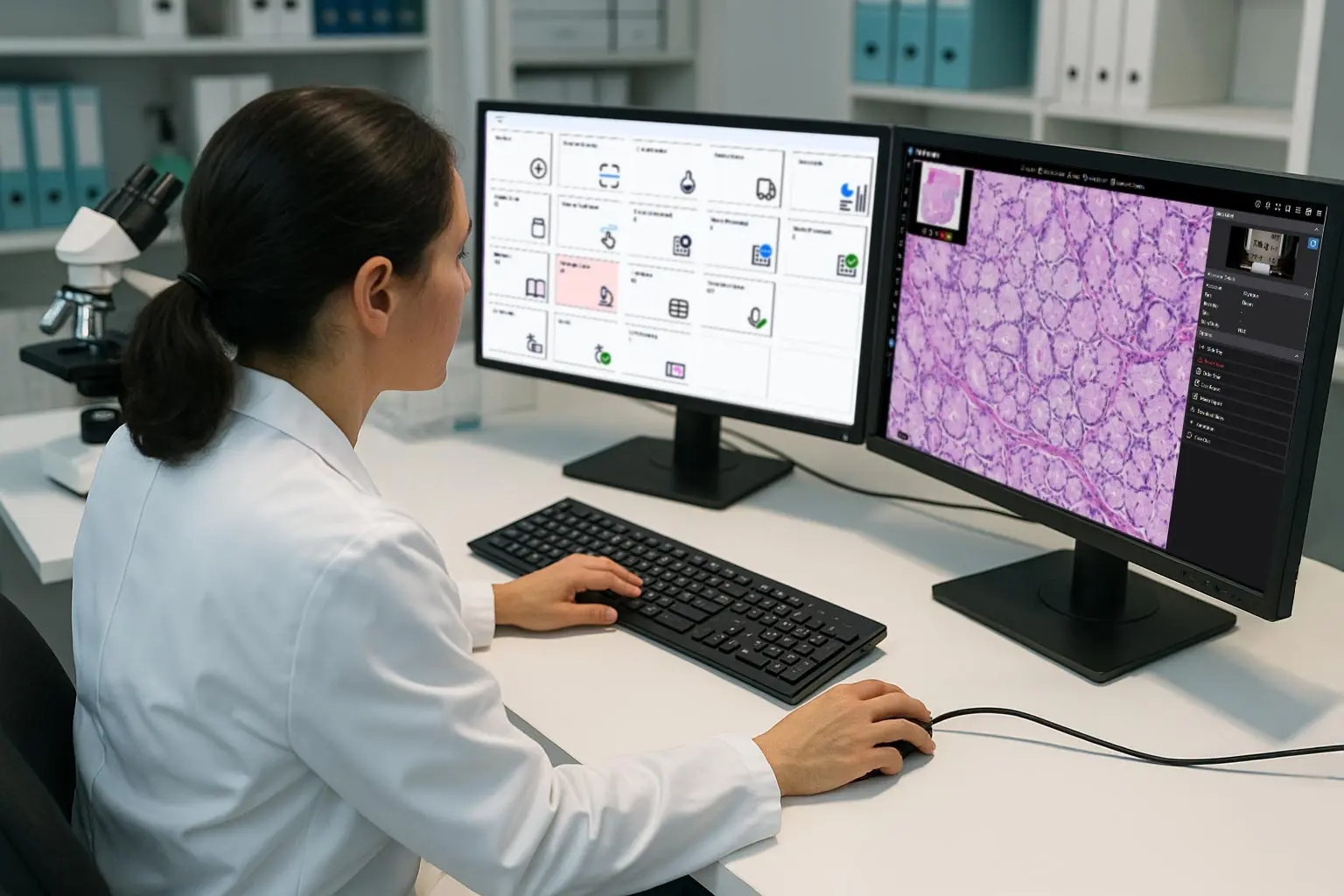Blog
Four Game-Changing Business Strategies to Improve Laboratory Processes
August 14, 2025
No matter the business type, one thing is abundantly clear. Your organization doesn’t operate in a vacuum but in a world where outside influences and variables can and do affect its trajectory.
For instance, just because something worked well in the past doesn’t mean it will continue to do so in the future. That’s because businesses are competitive by nature, and circumstances change, making it essential for an enterprise to continually seek innovative ways to enhance efficiency, reduce costs, differentiate, and improve overall performance.
Take the medical lab and its current challenges as a prime example. Gone are the days of abundant margins and available market shares, replaced by rate cuts pushed by government and private payers, consolidation among providers, and increased competition to gain and retain customers, all while compliance costs continue to rise amidst disruption caused by an unprecedented labor shortage.
These negative trends are troubling, but lab operators of clinical labs and pathology practices can protect themselves and even take advantage of the disruption by committing to four game-changing business strategies that can vastly improve a lab’s outlook and prepare it for a profitable future.
Modernize Processes
Modernizing clinical lab workflow is a great place to start. This strategy entails extracting processes from legacy environments and re-platforming them onto more advanced and efficient technologies.
A common and effective example of modernization is upgrading one’s laboratory information system (LIS software) technology.
Today’s medical lab landscape is constantly evolving. The only way to keep pace and thrive is to swap out legacy laboratory information systems with advanced pathology lab reporting software platforms designed by the best LIS software vendors to overcome modern challenges.
Legacy pathology LIS systems are rigid, requiring workarounds (which result in increased labor) and additional laboratory software systems (which equals more integration), data silos, and costs. Additionally, they’re often unreliable and prone to breakdowns, with limited features and functionality that hinder competitiveness and growth. In contrast, advanced LIS systems are designed to be comprehensive, highly configurable, and equipped to drive innovation within the laboratory.
The best LIS systems are cloud-based platforms that streamline and simplify lab workflow. They are also highly interoperable with other laboratory software systems and much more reliable than their legacy brethren. These are critical elements for any laboratory aiming to modernize operations, increase testing volumes, attract new clients, and enhance service to the community.
Learn More: Is Your Pathology Lab Reporting Software System Outdated and Lacking Functionality?

Optimize Processes
Advanced LIS laboratory information system software technology can also serve as a central, consolidated hub for optimizing processes. This strategy utilizes predictive analytics and simulations to run what-if scenarios across all workflows, helping labs pinpoint areas with the greatest optimization potential before making any changes.
The best LIS systems expertly manage lab data from the point of sample collection to the moment the finalized report has been delivered to the clinician. These medical LIS platforms enable pre-analytical automation, efficient sample tracking, and seamless data exchange with hospital and clinic electronic health record (EHR) systems.
Just as important, the data housed in these modern laboratory information systems is much more accessible than in legacy lab information system platforms, empowering lab directors and managers to analyze the data and make high-level and low-level process changes to improve efficiency, accuracy, and turnaround times while reducing waste and diagnostic errors.
The best laboratory information systems allow processes to be regularly optimized for peak performance and productivity.
Learn More: Understanding the Importance of Real-Time Analytics in the Modern Clinical Laboratory
Standardize Processes
Standardizing processes as a strategy focuses on continually improving consistency and quality within the lab. In simple terms, if it’s efficient and accurate, take the necessary steps as an organization to standardize it.
The workflow analysis functionality embedded within robust and modern laboratory information systems helps develop and standardize workflow in two ways. First, by providing lab leadership with mapping and tools to analyze the data, and second, by storing and managing standardized best practices that ensure every test is performed according to approved procedures.
The best LIS systems support standardization by driving automation (more on that shortly). They also enable consistent data entry and reporting templates, manage quality control across all tests and instruments, and ensure full compliance with regulatory requirements.
In addition to a high-performance lab information system, leadership can take further steps to standardize, such as developing and regularly updating Standard Operating Procedures (SOPs), introducing Lean Management techniques, and providing LIS staffing personnel with continuous improvement and cross-training programs.
Learn More: How Best Practices and Advanced Laboratory Information System Technology Help Ensure Lab Workflow Management

Automate Processes
We’ve saved the best for last because, in modern labs, automation is a prerequisite for success.
Innovative laboratory information system vendors have created modern LIS systems designed to automate several critical aspects of laboratory operations.
Advanced medical LIS systems with rule and automation engines streamline laboratory workflows by reducing manual tasks, increasing accuracy, and accelerating operations, allowing laboratory professionals to focus more on complex, high-value work that leverages their expertise.
Take the LigoLab platform for example. The rule engine empowers LIS system personnel to build and support as many rules and preferences as needed, and the automation engine strings these rules together. This provides LIS system users with unlimited configurability and control of operational (and laboratory billing) workflow.
Learn More: LigoLab’s Enterprise Tier Features a Sophisticated Automation Engine
Here are a few examples of processes that can be automated with these engines:
- Reflex Testing: The engines can automatically reflex additional tests based on specific results, ensuring fast and efficient processing without manual intervention.
- Workflow Changes: Rules can dynamically adjust the clinical lab workflow of specific samples based on various parameters, optimizing operations according to the lab's needs.
- Document Generation: Rules can trigger the automatic creation of specific reports, notifications, or requisitions, based on defined conditions.
- CPT Coding: Rules can be created that automatically assign or adjust CPT codes based on the specifics of the test or service performed, ensuring accurate lab billing and compliance.
- External System Calls: The rule engine can interact with external laboratory software systems, allowing seamless integration and automated coordination with other software or services.
- Case Flagging: The rule engine can flag cases, tests, samples, patients, or clients that meet specific criteria, signaling them for further attention or action, such as a customer service intervention.
It's also important to recognize that the impact of automation in a modern laboratory goes far beyond the examples mentioned above.
Below is a broader examination of various stages of the lab workflow, illustrating how automation reduces costs and contributes to greater lab productivity.
Sample Tracking and Management: Advanced laboratory information systems can automate the barcode tracking of a sample from reception to result, tracking the journey and updating the status throughout the process.
Automated Data Entry: The best LIS software can connect directly to electronic health records and laboratory instruments, allowing the automatic capture and recording of orders and test results directly into the system (without data entry and transcription errors).
Workflow Optimization: Advanced medical LIS systems can automate the routing of samples to the appropriate instruments or departments based on predefined criteria such as test type, priority, or specific patient requirements. This aids in lab workflow, ensuring that resources aren’t wasted and turnaround times are lessened.
Quality Control Checks: Modern LIS systems can automate the scheduling and execution of quality control checks (and automatically flag results that do not meet quality standards), leading to automatic reviews of cases, followed by necessary actions.
Decision Support: Modern LIS medical solutions can incorporate decision support tools that automatically interpret results based on set thresholds and clinical guidelines. This helps by providing preliminary interpretations that lead to faster and more accurate diagnoses.
Reporting and Notification: The best LIS systems can automate report generation once results are finalized. They can also automatically notify clinicians via email, SMS, or directly through integrated electronic health records when results are available, speeding up the communication process.
Laboratory Billing and Reimbursement: With the most advanced LIS systems that include integrated in-house laboratory revenue cycle management (lab RCM), automation extends seamlessly into the laboratory billing process. In this all-in-one setup, lab billing shifts from a largely manual backend task to a highly automated, frontend operation, where CPT and ICD coding are automatically applied, and claims undergo validation and error correction scrubbing before submission to billing departments or external payers. This significantly reduces administrative workload and minimizes errors.
Maintenance Scheduling: Modern LIS systems can monitor the usage of instruments and automatically schedule maintenance or recalibration. This prevents downtime and ensures that all instruments are operating at optimal levels.
Compliance and Auditing: The best LIS laboratory information systems automatically track and log all user actions and changes within the platform—an essential capability for maintaining compliance with regulatory agencies.
Integration with Hospitals and Health Systems: Advanced LIS systems feature robust integration capabilities, enabling automated data exchange across platforms with their clinician customers. This ensures consistency and accuracy in patient records and timely deliveries across all departments.
Industry Insights: From System of Record to System of Action: The Next Evolution of Laboratory Information Systems

Process Improvement Starts with Advanced Laboratory Information Systems
With negative trends persisting and the demand for faster and more accurate diagnoses growing throughout the industry, it’s time for lab leaders to embrace process improvement strategies supported by advanced laboratory information systems. By doing so, they’ll be properly positioned to meet current needs and challenges and be prepared for future opportunities.
Selecting the best LIS system provider means choosing a partner dedicated to the success of your laboratory. It means adopting a modern system that offers adaptability, control, and the ability to respond to future changes.
Ready to see how an advanced lab information system can support your lab goals?






